- Home
- Iain Pears
An Instance of the Fingerpost Page 27
An Instance of the Fingerpost Read online
Page 27
How long I lay there I am not sure, but it must have been some considerable time: I assume (I was sharing the place with half a dozen others) that there must have been some coming and going, to which I was entirely insensible. All I know is that when I recovered my senses, my beard had grown to a stubble, my limbs were weak and I had to shave before I could show my face to the world once more. The water from the well was freezing cold, but I presented a reasonably civilised appearance when I went down to the inn across the courtyard. I had half-forgotten what had transpired, but it came back to me in a flash when I walked through the door. Dead silence, followed by a snicker. I walked up to ask for some beer, and the man beside me turned his back, in the cruel way that comes so naturally to the coarse – although considering the example they had been set by their betters, perhaps it was not so surprising.
It is hard to relive such humiliations, and even now I find my hand shakes as I dip my pen in the ink and write these words down. So many years have passed, with such grace and goodness in them, yet that moment still cuts deep and the anger returns. I have been told that the heart of a gentleman is the more open to such wounds than those of ordinary people because his honour is the greater, and it may be so. I would have continued had it been likely to serve any purpose, but I knew that the incident had ruined my expedition; there was no way now that I could approach Edward Villiers with any hope of a polite reception, and I would not expose myself to another rebuff. There was no alternative but to leave as swiftly as possible, although I was determined that, before I did so, I would gaze on the face of Sir John Russell, to see whether it matched the vision I had seen in Mrs Blundy’s bowl of water. Mordaunt’s visage had not, of which I was heartily glad, and I already knew that of Villiers was also different. I confess I hoped that Sir John, who had already done enough to earn my lifelong enmity, would compound his sin and make my quest more simple.
Alas, it was not to be; I spent many hours lurking outside the inn, and (as quietly as possible, so as not to be recognised) outside the fashionable gatherings, listening with gloom to the sounds of revelry within, getting myself soaked to the skin by the first rains of autumn as I stood, doggedly and patiently. Eventually I was rewarded, after a fashion. I had tipped a stall-keeper to point out Sir John when he emerged, and as I was almost giving up hope, he nudged me in my ribs and hissed in my ear: ‘’Ere he is, in all his finery.’
I looked, half-expecting to see an almost familiar face coming down the steps. ‘Where?’ I said.
‘There. That’s him,’ said the trader, pointing out a roly-poly, fat man with a pink face and a straggly, old-fashioned moustache. I watched with the greatest disappointment as this creature (who looked neither deceitful nor familiar) got into a waiting coach. He was not the man that the Blundy woman had shown me.
‘Go on then,’ said the man, ‘go and present your letter.’
‘My what?’ I said, having forgotten entirely that this was my supposed reason for wanting to know who he was. ‘Oh, that. Later, maybe.’
‘Nervous, eh? I know. But let me tell you, young sir, you’ll not get anywhere with this bunch unless you go ahead with your plans.’
I decided to take this unsought, but probably good, advice by packing my bags and leaving the town. It did not contain what I was looking for.
Chapter Six
* * *
IT IS MID-AFTERNOON and I am told (you note how it is these days – I am told) that we are setting off for my country seat in the morning; I have little time to continue my narrative. I have already had my head shaved for that damn fool wig, the tailor has been to see me, all is busy with activity. So many things there are to prepare and to get ready, and I care nothing for any of them. These tedious little details are hardly germane to my story, but I notice this tendency in me; it comes more frequently now. My dotage, I suppose it is; I find that I can remember what happened all those years ago more easily than I recall what I was doing the day before yesterday.
To return to my story, I arrived back in Oxford with a deep resentment in my heart and an ever greater determination to defeat my hidden enemies. I had been away more than two weeks, and in that time the town had filled with students and was no longer the quiet, rustic place it is much of the year. Fortunately, this also meant that all those whose help I needed were now in residence. One was Thomas, of course, whose logic-chopping skills, honed in the theological and logical arts which he taught with surprising skill to students, were vital: he could whip through a pile and tease out a meaning faster than anyone I knew. The other was an odd little fellow he brought to see me one day. His name was Anthony Wood.
‘Here’, Thomas said presenting Wood to me in his room, ‘is the answer to all of your problems. Mr Wood is a great scholar and keen to help you in your search.’
Cola describes him briefly and it is one of the few occasions when I can find only small fault with his penmanship; I have never met a more ridiculous creature than Anthony Wood. He was a deal older than myself, perhaps thirty or thereabouts, but already had the bowed back and sunken cheeks of the bookworm. His clothes were monstrous – so old and patched it was hard to see how out of fashion they were – his stockings were darned, and he had the habit of throwing his head back and whinnying like a horse when he was amused. An unpleasant, grating sound which made all in his company suddenly grave, lest they say something witty and be rewarded with his laughter. This, combined with the general inelegance of his movements – all jerks and twitches, so that he could barely sit still for more than a few seconds – began to irritate me the moment I set eyes on him, and it was hard indeed for me to keep my patience.
But Thomas said he would be useful, so I forbore to make fun of him. Unfortunately, the connection, once begun, proved hard to break. Like all scholars, Wood is poor and constantly in search of patronage: they all seem to think that others should pay for their diversion. He has never had any from me, but has never despaired either. He still comes to pay court, in the hope that a coin might slip from my pocket into his ink-stained hands, and never ceases to remind me of the services he rendered all those years ago. He was here a few days back, in fact, which is why he is so fresh in my memory, but said nothing of consequence. He is writing a book, but what is there in that? He has been writing the same one since ever I knew him, and it seems no nearer its conclusion. And he is one of those wiry little men who never seem to age at all, beyond stooping a little more, and acquiring a few more lines on his face. When he comes into a room, it is as though half my life has not happened, and is only a dream. It is only my own aches that remind me.
‘Mr Wood is a great friend of mine,’ Thomas explained when he saw the look of disgust on my face as I regarded the fellow. ‘We play music together every week. He is a monstrous student of history and over the last few years has accumulated a great deal of information about the wars.’
‘Fascinating,’ I said dryly. ‘But I fail to see how he can help.’
Wood now spoke, in that high-pitched, fluting voice of his: such precise, mincing enunciation, as neat as a notebook, and scarcely more interesting.
‘I have had the honour of encountering many people’, he said, ‘distinguished in war and in public affairs. I have a substantial knowledge of this country’s tragic course, which I would be happy to place at your disposal to establish what became of your father.’
I swear he talked like that all the while, all his sentences as perfectly formed as he was grotesque himself. I was not sure what to make of this offer but Thomas told me I must certainly accept, as Mr Wood was already known for the niceness of his judgement and the voluminous nature of his knowledge. If I needed to know anything about any event or any personality, then I must certainly ask Wood first of all: it would save me a great deal of time.
‘Very well,’ I said. ‘But I wish to make it clear that you will tell no one of my search. There are many people who would be my enemies if they knew what I am doing. I wish to take them by stealth.’
W
ood agreed reluctantly, and I told him that I would lay all the facts and information before him in due course, so that he might supplement my findings with information of his own. Then Thomas considerately bundled him out of the room, and I gave my friend a wry and reproachful look.
‘Thomas, I know I am in need of all the help I can get . . .’
‘You are wrong, my friend. Mr Wood’s knowledge may be crucial to you one day. Do not dismiss him because of his appearance. I have also thought of another useful person for you.’
I groaned. ‘Who might this be, then?’
‘Dr John Wallis.’
‘Who?’
‘He is the Savilian Professor of Geometry, and was deep in the confidence of the Commonwealth by virtue of his skill with codes. Many a secret letter of the king’s did he reveal to Thurloe’s office, so they say.’
‘Should have been hanged, then . . .’
‘And now he performs the same service for His Majesty’s government, it is rumoured. Lord Mordaunt told you the documents incriminating your father used a cipher: if so, then Dr Wallis might know something of the matter. If you can persuade him to help . . .’
I nodded. Perhaps for once one of Thomas’s ideas was going to be useful.
Before either Mr Wood or Dr Wallis could do much to help me, I had an opportunity to repay some of my debt to Thomas by rescuing him from one of the most absurd pieces of ill judgement. The circumstances were highly amusing, if a little worrying. Everyone knew that Old Tidmarsh the Quaker held some grotesque conventicle in his little house down by the river. Illegal, of course, and considering the trouble such lunatics had already caused, they should have been crushed mercilessly. But no; every now and then a few were locked up, then they were let out again, free to resume their loathsome ways. In fact, they seemed to take pride in it, and blasphemously likened their own sufferings to those of Our Lord Himself. Some (I heard) even claimed to be the Lord in their arrogance, and ran around, shaking their heads and pretending to cure people. The world was full of such madmen in those days. Imprisonment is not the way to deal with such people; half measures merely feed their pride. Leave ’em alone or hang ’em, in my opinion. Or better still, pack them off to the Americas, and let them starve.
Anyway, I was walking down by the castle a few evenings later when I heard a lot of noise and the sound of running feet. For once, it seemed the magistrate had decided to do something. There were sectaries everywhere, jumping out of windows, running this way and that, like ants bestirred in their nest. Never let these people tell you, incidentally, that they sit still and sing psalms when arrested. They are as frightened as anyone.
I stood and watched the sport with merriment until I saw, with great surprise, my friend Thomas all but falling out of the window of Tidmarsh’s house, and running up an alleyway.
Instantly, as any friend would, I gave chase. Of all the stupid people, I thought, he was perhaps the stupidest. Here he was, risking his future by indulging his ridiculous piety at the very moment when absolute and total conformity was required.
He was no sportsman, and I caught up with him without any trouble. He almost fainted, poor soul, when I grabbed him by the shoulder and brought him to a halt.
‘What in God’s name do you think you’re doing?’
‘Jack!’ he said with the most profound relief. ‘Thank God. I thought it was the watch.’
‘And so it should be. You must be mad.’
‘No. I . . .’
The explanation for his absurdity was cut short, however, for two men of the watch now hove into view. We were in an alley, and running would not get us out of trouble. ‘Keep quiet, lean on my shoulder and leave it to me,’ I whispered as they approached.
‘Good evening, sirs,’ I cried, slurring my words like one very much drunker than I was.
‘And what are you two doing?’
‘Ah,’ I said. ‘Missed the curfew again, have we?’
‘Students, are you? Colleges, please?’ He peered at Thomas, whose impression of being drunk was sadly lacking. Had he just a little experience of inebriation he might have done better.
‘Where have you been for the last two hours?’
‘In the tavern with me,’ I said.
‘I don’t believe you.’
‘How dare you doubt my word?’ I replied stoutly. ‘Where do you think we were?’
‘Attending an illegal assembly.’
‘You must be joking,’ I said with a fine demonstration of merriment at the absurdity of the idea. ‘Do I look like a fanatic? We may be drunk, but it is not with the word of God, I’m glad to say.’
‘I meant him.’ He pointed at an ever-paler Thomas.
‘Him?’ I cried. ‘Oh, dear me no. Ecstasy has been his tonight, but very far from divine. I’m sure the lady concerned would vouch for his devotion, though. Don’t let the clerical air fool you.’
Thomas blushed at my words, and fortunately this was interpreted as shame.
‘I, for my part, have been playing cards, with some considerable success.’
‘Really.’
‘Yes. And I am in a splendid mood; I wish to share my good fortune with all the world. Here, sir. Have this shilling and drink my health.’
He took the coin, looked at it for a fraction of a second, and then greed overcame duty. ‘And if you are chasing Quakers,’ I continued happily once it was tucked away in his pocket, ‘I saw two gloomy types running up the street over there not three minutes ago.’
He looked at me and grinned, showing his gaping gums. ‘Thank you, young sir. But the curfew is on. If you’re still here when I get back . . .’
‘Have no fear. Now run quickly, or you will miss them.’
I breathed an enormous sigh of relief as they ran off, then turned to Thomas, who showed distinct signs of being sick.
‘That’s a shilling you owe me,’ I said. ‘Now, let’s get out of here.’
We walked back in silence to New College; I needed to talk to him but could not possibly do so in my own lodging, crammed in as I was with my tutor – who, I imagined, was already in bed. Thomas, however, being now a senior member of a wealthy college, had the freedom to come and go without bothering about the curfews which plagued my life. Small and poky though his room was, he did not have to share it with his students – a luxurious innovation which caused much comment when introduced.
‘You must be out of your mind, my friend,’ I said vehemently when the door was closed. ‘What on earth were you doing? Indulge your sentiments in private if you must; but to advertise them and risk jail when you are trying to secure yourself a living and a wife is madness.’
‘I was not . . .’
‘No, of course not. You just happened to be amongst that band of Quakers not knowing who they were, and climbed out of the window and ran away for the exercise.’
‘No,’ he said, ‘I was there deliberately. But for a good reason.’
‘No reason is good enough for that.’
‘I went to talk to someone. Win their confidence.’
‘Why?’
‘Because I fear I may not get my parish after all.’
‘You certainly won’t if you behave like this.’
‘Will you listen to me?’ he pleaded. ‘Grove is pressing his case and is winning over several members of the Fellowship whom I assumed were on my side. And now he is talking to the warden.’
‘What can he say?’
‘Simple. That he is old and a bachelor, while I will undoubtedly marry and have a family. His needs, in contrast, are simple, and he will hand over a third of the annual revenue from the living to the college.’
‘Can he do that?’
‘If he gets it, he can do whatever he wants; it’s his money. He is calculating that it is better to have two-thirds of eighty pounds a year than none of it. And Woodward is very mindful of college funds.’
‘And you can’t match the offer?’
‘Of course I can’t,’ he said with bitterness. ‘I wish t
o marry. The girl’s father is only just willing to support the match if I have the full amount. What would your reaction be if I went along and said I’d given a third away?’
‘Find another wife,’ I suggested.
‘Jack, I like her. She is a good match, and that living is mine.’
‘I see your problem. But not what it has to do with climbing out of windows.’
‘Grove is unsuitable to be in charge of a flock. He will bring scandal on to the Church, and drag its good name in the dirt. I know this well, but as long as he was kept away from a living it was not my affair.’
‘I’m still not following you.’
‘He is a lecher. I’m sure of it. He engages in illicit concourse with that servant of his, to the shame of the college and the Church. It is a disgrace. If his perfidy is proven, then the college will not risk its reputation by giving him a parish. I was trying to discover the truth.’
‘At a meeting of Quakers?’ I said incredulously. The story was getting worse and worse.
‘This servant attends sometimes, and is said to be important to them, in fact,’ he said. ‘She has a great reputation amongst them for reasons I do not understand. I thought if I attended, I could win her confidence . . .’
I’m afraid that here I burst out laughing. ‘Oh, Thomas, my dear friend. Only you could try and seduce a girl on your knees.’
He blushed scarlet. ‘I was not trying to do anything of the sort.’
‘No, of course not. Who is this creature, anyway?’
‘A girl called Blundy. Sarah Blundy.’
‘I know her,’ I said. ‘I thought she was quite a good girl.’

 The Dream of Scipio
The Dream of Scipio Stone's Fall
Stone's Fall The Last Judgement
The Last Judgement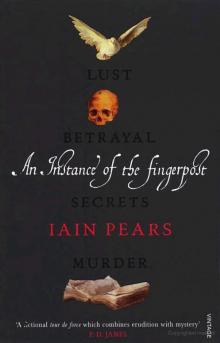 An Instance of the Fingerpost
An Instance of the Fingerpost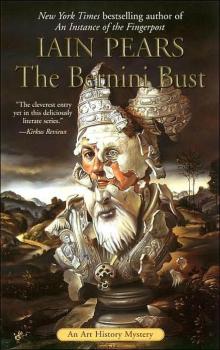 The Bernini Bust
The Bernini Bust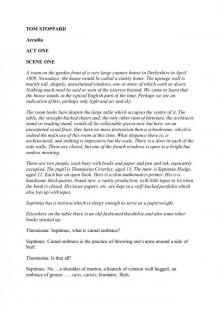 Arcadia
Arcadia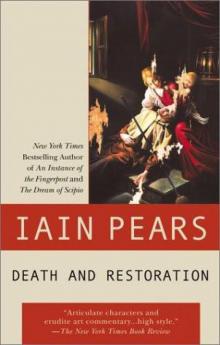 Death and Restoration
Death and Restoration The Raphael Affair
The Raphael Affair The Titian Committee
The Titian Committee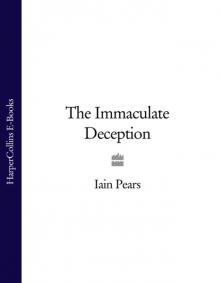 The Immaculate Deception
The Immaculate Deception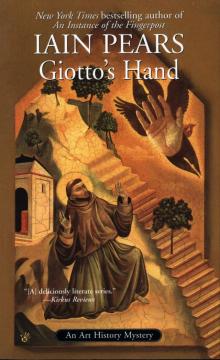 Giotto's hand
Giotto's hand The Portrait
The Portrait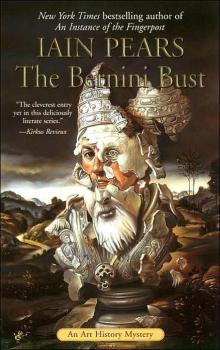 The Bernini Bust ja-3
The Bernini Bust ja-3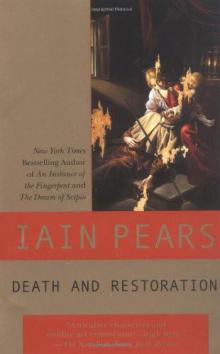 Death & Restoration ja-6
Death & Restoration ja-6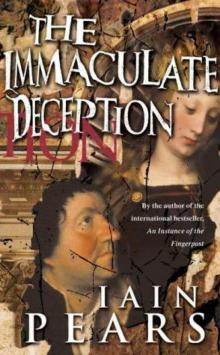 The Immaculate Deception ja-7
The Immaculate Deception ja-7